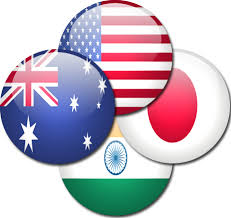International Relations
Quad & India
- 01 Oct 2020
- 8 min read
This article is based on “On the Quad, define the idea, chart a path” which was published in The Hindu on 1/10/2020. It talks about the opportunity and issues related to Quad (an informal group of India, the US, Australia and Japan) for India.
Recently, it has been reported that the second Ministerial meeting of Quad countries will be held in Japan. Quadrilateral Security Dialogue (Quad) is the informal strategic dialogue between India, USA, Japan and Australia with a shared objective to support a “free, open and prosperous” Indo-Pacific region, that China seeks to threaten.
The manner of China’s dismissal of the Arbitral Award in the dispute with the Philippines on the South China Sea, militarisation of the islands in the region and individual conflicts with Quad countries have once again brought the four countries onto the same page and given a second chance to the Quad.
Engaging with Quad may serve two geo-strategic goals of India viz. countering China’s aggressive on border with India’s assertives in the maritime domain and emerge as a net security provider in the region.
Backdrop of Quad
- China’s unilateral claim on the Nine-Dash Line in the South China Sea; rapid warship building its first overseas base in Djibouti; and its surface and subsurface activities in Indian Ocean beyond the Malacca Straits have alarmed regional countries like India and Japan about increasing Chinese ambition.
- In this context, the idea of Quad was first mooted by Japanese Prime Minister Shinzo Abe in 2007.
- However, the idea couldn’t move ahead with Australia pulling out of it, apparently due to Chinese pressure.
- In December 2012, Shinzo Abe again floated the concept of Asia’s “Democratic Security Diamond” involving Australia, India, Japan and the US to safeguard the maritime commons from the Indian Ocean to the western Pacific.
- In November 2017, India, the US, Australia and Japan gave shape to the long-pending "Quad" Coalition to develop a new strategy to keep the critical sea routes in the Indo-Pacific free of any influence (especially China).
- Quad is criticised by China as asian version of the North Atlantic Treaty Organization (NATO).
Opportunities for India Under Quad Arrangement
Checkmating China
- The maritime space is a lot more important to China than engaging in opportunistic land grab attempts in the Himalayas.
- A huge chunk of Chinese trade happens via the Indian oceanic routes that pass through maritime chokepoints.
- In the event of any chinese aggression on borders, India by cooperation with Quad countries can potentially disrupt chinese trade.
- Hence, unlike in the continental sphere where India seems facing a ‘nutcracker like situation’ due to China-Pakistan collusion, the maritime sphere is wide open to India to undertake coalition building, rule setting, and other forms of strategic exploration.
Emerging as a Net Security Provider
- There is a growing great power interest in the maritime sphere, especially with the arrival of the concept of ‘Indo-Pacific’. For instance, many european countries have recently released their Indo-Pacific strategies.
- With India, located right at the centre of the Indo-Pacific geopolitical imagination can realise the vision of a ‘broader Asia’ that can extend its influence away from geographical boundaries.
- Moreover, India can build around collective action in humanitarian assistance and disaster relief, monitoring shipping for search and rescue or anti-piracy operations, infrastructure assistance to climatically vulnerable states, connectivity initiatives and similar activities.
- Further, India with Quad countries can check imperialist policies of China in Indian ocean region and ensure Security and growth for all in the region.
Issues Related to Quad
- Undefined Vision: Despite the potential for cooperation, the Quad remains a mechanism without a defined strategic mission.
- Maritime Dominated: The entire focus on the Indo-Pacific makes the Quad a maritime, rather than a land-based grouping, raising questions whether the cooperation extends to the Asia-Pacific and Eurasian regions.
- India’s Aversion of Alliance System: The fact that India is the only member that is averse to a treaty alliance system, has slowed down the progress of building a stronger Quadrilateral engagement.
Way Forward
- Need For Clear Vision: The Quad nations need to better explain the Indo-Pacific Vision in an overarching framework with the objective of advancing everyone’s economic and security interests.
- This will reassure the littoral States that the Quad will be a factor for regional benefit, and a far cry from Chinese allegations that it is some sort of a military alliance.
- The forthcoming Ministerial meetings can be an opportunity to define the idea and chart a future path.
- Expanding Quad: India has many other partners in the Indo-Pacific, therefore India should pitch for countries like Indonesia, Singapore to be invited to join in the future.
- Need for a Maritime Doctrine: India should develop a comprehensive vision on the Indo-Pacific which would ideate on the current and future maritime challenges, consolidate its military and non-military tools, engage its strategic partners.
Conclusion
In order to secure national and regional interests, India should now focus on the maritime sphere also. In this context establishing a new division under the Ministry of External Affairs (MEA) to deal with the Indo-Pacific is a step in the right direction.
|
Drishti Mains Question “In order to secure national and regional interests, India should now focus more on the maritime domain”. Discuss the statement in light of India’s engagement with Quad countries. |
This editorial is based on “A costly pause” which was published in The Indian Express on September 30th, 2020. Now watch this on our Youtube channel.







